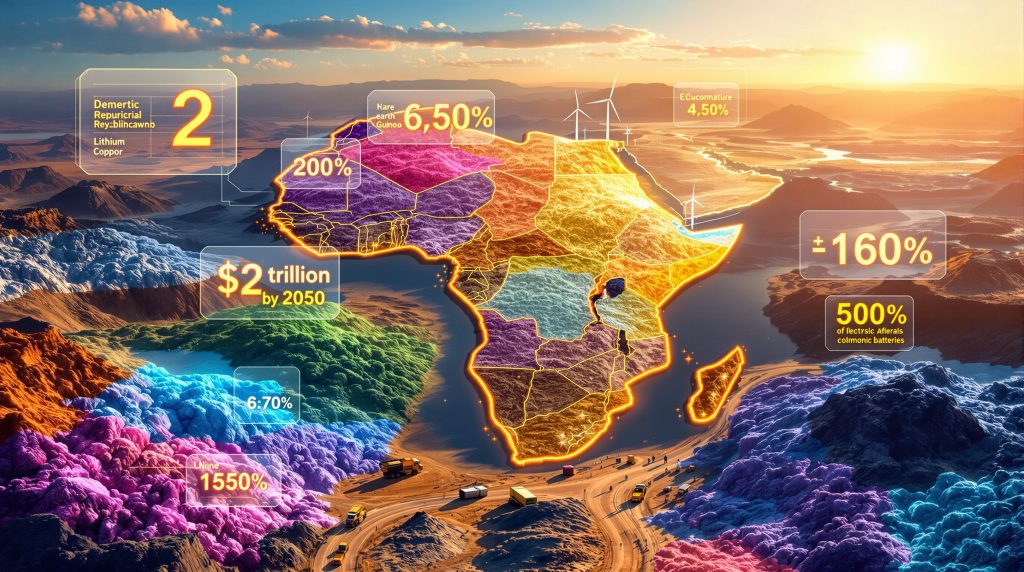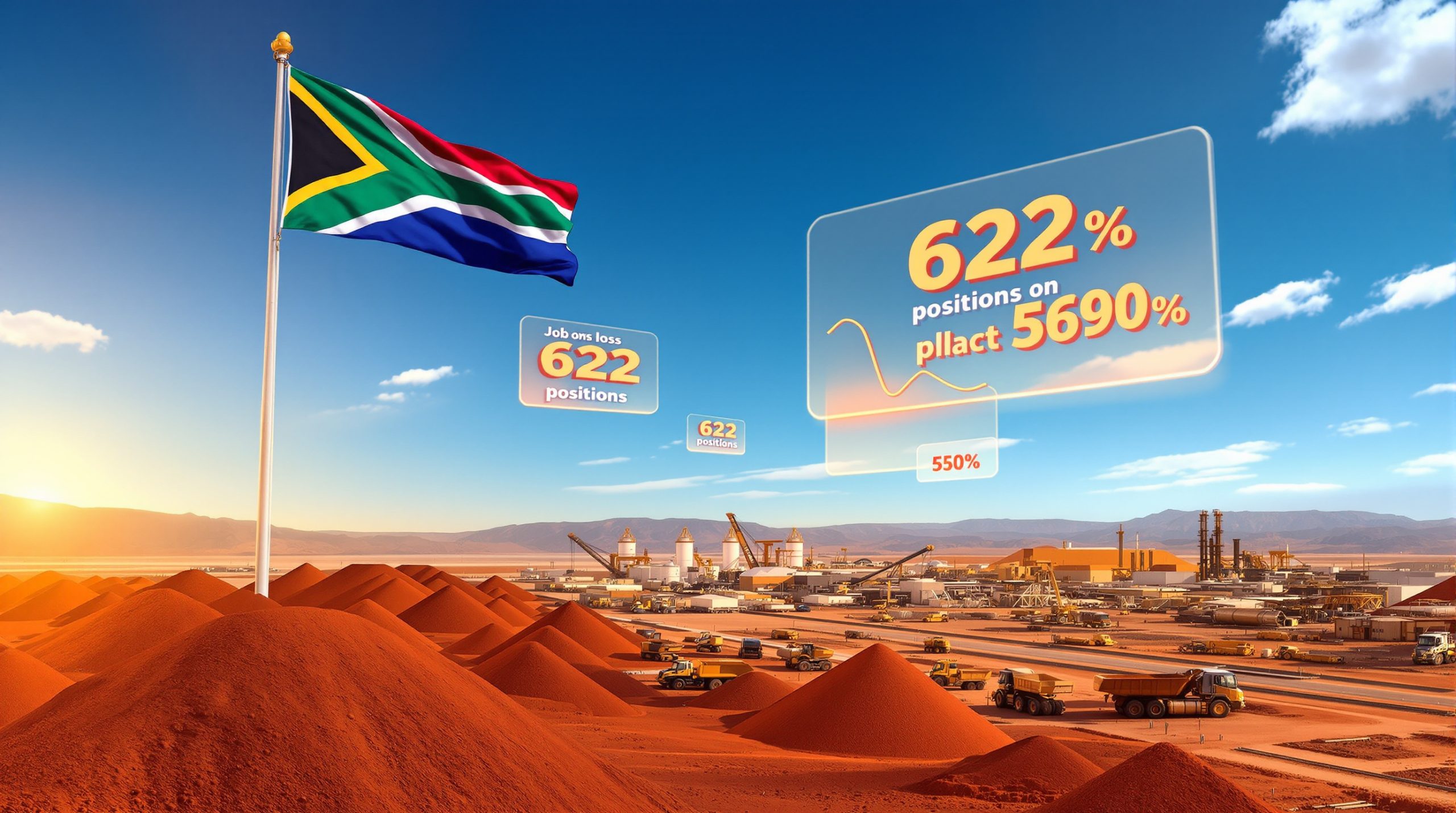Africa's Strategic Position in Global Mineral Markets
The continent commands approximately 30% of the world's critical mineral reserves, establishing its role as an indispensable supplier for the global energy transition. These deposits encompass substantial cobalt, lithium, nickel, copper, graphite, and rare earth elements that power everything from electric vehicle batteries to renewable energy infrastructure. Furthermore, the question of whether can africa ride critical minerals wave to economic boom depends largely on how effectively these resources are developed and processed.
Africa's mineral wealth concentrates in specific regions, creating geographic advantages for targeted development initiatives. The Democratic Republic of Congo supplies 70% of global cobalt, while Zimbabwe has emerged as Africa's leading lithium producer. South Africa maintains dominant positions in platinum and manganese markets, and Guinea controls significant bauxite deposits essential for aluminum production.
The International Energy Agency projects dramatic demand increases through 2040, with lithium requirements growing fivefold, graphite and nickel doubling, and cobalt plus rare earth elements expanding 50% to 60%. This surge directly correlates with accelerating electric vehicle adoption, renewable energy deployment, and digital infrastructure expansion worldwide.
Current Reserve Distribution:
• Democratic Republic of Congo: Controls 70% of global cobalt supply chains
• Zimbabwe: Africa's premier lithium producer with expanding processing capacity
• South Africa: Major platinum group metals and manganese operations
• Zambia: Significant copper belt infrastructure and production
• Guinea: Extensive bauxite reserves supporting global aluminum markets
• Madagascar: Emerging graphite producer with high-quality deposits
The convergence of abundant reserves and surging global demand creates unprecedented opportunities for economic transformation across the continent. However, realising this potential requires strategic approaches to value addition, infrastructure development, and regional cooperation. Additionally, recent developments like the namibia uranium halt demonstrate the complex dynamics affecting African mineral production.
Economic Transformation Through Value-Added Processing
Economic projections suggest African critical minerals output could generate substantial revenue streams by 2050, representing unprecedented wealth creation opportunities. This potential assumes strategic development of processing capabilities rather than continued dependence on raw material exports.
Processing facilities create exponentially more employment opportunities than extraction operations alone. Industrial-scale mineral refining generates diverse job categories spanning technical operations, quality control, maintenance, administration, and support services. Each processing facility typically supports broader economic ecosystems through supply chain integration and service provision.
Infrastructure investment catalysed by mineral processing creates multiplier effects across regional economies. Development necessitates power generation expansion, transportation network improvements, port facility upgrades, and telecommunications infrastructure. These investments support economic diversification beyond the mining sector itself.
Employment Creation Framework:
• Technical positions: Process engineers, metallurgists, chemical technicians
• Operations roles: Equipment operators, maintenance specialists, quality inspectors
• Administrative functions: Logistics coordinators, environmental specialists, safety managers
• Support services: Transportation, catering, equipment suppliers, consultancy services
Zimbabwe's policy implementation demonstrates practical value-addition approaches. The country requires lithium mining companies to establish in-country refining operations, creating new employment opportunities beyond traditional extraction activities. As Environment Minister Evelyn Ndlovu explains, "We are creating new jobs, not only in the mining sector, but in the value addition of our minerals. We have got a lot of people coming in to invest in Zimbabwe."
China's Zhejiang Huayou Cobalt exemplifies foreign investment in African processing infrastructure, committing $400 million to a lithium sulphate plant in Zimbabwe. Production is scheduled to commence during the first quarter of 2026, representing concrete progress toward downstream integration.
The economic transformation potential extends beyond immediate employment and revenue generation. Processing capabilities position countries to participate in higher-value segments of global supply chains, reducing vulnerability to commodity price volatility while building industrial expertise and technological capacity. Moreover, effective south africa beneficiation strategies provide valuable lessons for other African nations seeking to add value to their mineral resources.
Leading African Mineral Producers and Emerging Players
Current production leadership concentrates among established mining nations, each with distinct mineral specialisations and processing capabilities. The Democratic Republic of Congo's cobalt dominance, providing 70% of global supply, illustrates both opportunity and challenge in mineral-dependent economies.
Tier 1 Production Leaders:
| Country | Primary Minerals | Processing Development | Investment Activity |
|---|---|---|---|
| DRC | Cobalt, Copper | Limited local refining | Expanding Chinese partnerships |
| South Africa | Platinum, Manganese | Established smelting capacity | Diversification initiatives |
| Guinea | Bauxite | Minimal value-addition | Resource nationalism policies |
| Zambia | Copper | Some local processing | Infrastructure modernisation |
Zimbabwe represents the most aggressive approach to mandatory local processing. The government requires mining companies to establish domestic refining operations as licensing conditions, fundamentally altering traditional export-oriented business models. This policy shift attracts processing-focused foreign investment rather than purely extractive operations.
Emerging producers across the continent possess significant untapped potential. Madagascar's graphite deposits, Mali's lithium reserves, and Mozambique's mineral diversity create opportunities for new entrants in critical mineral markets. These countries study Zimbabwe's processing mandate model while developing their own value-addition strategies.
Second-Tier Emerging Producers:
• Madagascar: High-quality graphite with expanding production capacity
• Mali: Lithium deposits attracting international exploration investment
• Mozambique: Graphite operations with port access advantages
• Tanzania: Nickel potential supporting battery material supply chains
• Ghana: Developing lithium processing capabilities
The Zhejiang Huayou Cobalt investment in Zimbabwe demonstrates how processing mandates attract capital toward value-addition rather than raw material extraction. The $400 million lithium sulphate facility will produce intermediate products for battery manufacturing, positioning Zimbabwe within global supply chains beyond primary commodity provision.
Processing capacity development requires substantial technical expertise, consistent power supply, and transportation infrastructure. Countries successfully implementing value-addition policies typically combine regulatory requirements with investment incentives and infrastructure development programmes. In this context, understanding energy transition minerals becomes crucial for strategic planning.
Infrastructure Constraints Limiting Value Addition
Power generation capacity represents the most significant barrier to industrial-scale mineral processing across Africa. Mining operations already consume substantial portions of available electricity in countries like Zambia and DRC, creating severe constraints for energy-intensive downstream processing operations.
Industrial mineral refining requires consistent, high-capacity power generation currently unavailable across much of the continent. Lithium processing, cobalt refining, and rare earth element separation demand sustained electricity supply with minimal interruptions. Power outages can damage equipment and compromise product quality in chemical processing operations.
Transportation infrastructure gaps create additional obstacles to processing facility development. Limited rail connectivity, inadequate port capacity, and poor road infrastructure increase operational costs while restricting market access for processed minerals.
Critical Infrastructure Deficits:
| Infrastructure Type | Primary Challenges | Regional Examples |
|---|---|---|
| Power Generation | Insufficient capacity, unreliable supply | Zambia, DRC electricity shortages |
| Rail Networks | Limited connectivity, ageing infrastructure | Zambia-Angola corridor development |
| Port Facilities | Capacity constraints, inefficient operations | West African bauxite export bottlenecks |
| Road Systems | Poor maintenance, limited mine access | Central African mining regions |
Skills development represents another fundamental constraint on processing expansion. Industrial mineral refining requires specialised technical expertise in metallurgical engineering, chemical processing, and quality control systems. Current educational infrastructure produces insufficient graduates in these critical disciplines across most African countries.
The Lobito Corridor railway connecting Zambia's copper belt to Angola's Atlantic coast exemplifies infrastructure projects essential for mineral value-addition. This transportation link reduces export costs while providing capacity for processed mineral shipments rather than raw commodity transportation alone.
Processing facility development requires coordination between power generation, transportation, and human capital investments. Countries successfully implementing value-addition policies typically combine infrastructure development with processing mandates and investor incentives. However, industry evolution trends suggest that technological advances may help overcome some traditional infrastructure constraints.
Trade Policy Impact on Mineral Beneficiation
Regional trade barriers create artificial obstacles to continental mineral processing networks. High tariffs between African countries restrict component movement and finished product distribution within integrated supply chains. The African Continental Free Trade Area framework aims to eliminate these barriers, but implementation remains limited with fewer than half of member states actively trading under the agreement.
Export-oriented tax structures in many African governments favour raw material exports over local processing operations. Mining companies receive fiscal incentives for extraction activities while facing regulatory uncertainty around downstream investment. This policy framework naturally channels investment toward traditional commodity export models.
Resource nationalism trends across West Africa increasingly impose local processing requirements on international mining companies. Guinea recently modified foreign mining rights, demanding value-addition commitments from international operators. These policy shifts reflect growing domestic pressure for mineral wealth to support broader economic development.
Trade Barrier Categories:
• Tariff structures favouring raw material exports
• Complex customs procedures increasing processing costs
• Limited regional trade integration reducing market access
• Currency exchange complications across multiple jurisdictions
• Inconsistent regulatory standards between neighbouring countries
As senior fellow Hany Besada from the London School of Economics emphasises, addressing barriers to trade remains critical for successful mineral beneficiation. Without addressing these constraints, efforts toward mineral processing and industrialisation remain aspirational rather than practical.
The African Continental Free Trade Area represents the continent's most ambitious integration project, creating a potential 1.4 billion person market. Successful implementation could enable cross-border mineral processing networks, shared infrastructure development costs, and coordinated negotiating positions with international partners.
Military regimes in several West African countries have accelerated resource nationalism policies, imposing stricter local content requirements on foreign mining operations. These developments reflect domestic political pressure for mineral wealth to translate into visible economic benefits rather than export revenues alone. Furthermore, broader tariffs and investment considerations may influence regional trade policies.
Geopolitical Competition and Strategic Partnerships
The United States, European Union, and China compete intensively for African critical mineral access, each offering distinct partnership models. American approaches emphasise development finance and infrastructure investment, while European strategies focus on technical assistance and regulatory harmonisation. Chinese models typically involve direct investment in processing facilities and long-term supply agreements.
Supply chain security concerns drive competitive bidding for African mineral resources. Global powers recognise that over-dependence on single suppliers creates strategic vulnerabilities, particularly in critical mineral sectors supporting energy transition and defence applications. This competition potentially benefits African producer countries through improved contract terms and investment commitments.
Technology transfer negotiations increasingly characterise African government approaches to mineral development agreements. Countries demand knowledge sharing and technical capacity building as conditions for mineral access rights. These requirements could accelerate local industrial expertise development if properly structured and implemented.
Partnership Model Comparison:
• US Approach: Infrastructure investment, development finance, technical training
• European Strategy: Regulatory assistance, environmental standards, trade partnerships
• Chinese Model: Direct processing investment, long-term supply contracts, infrastructure construction
• Emerging Alternatives: South-South cooperation, regional integration initiatives
President Donald Trump's tariff policies could provide momentum for African Continental Free Trade Area implementation. Trade barriers imposed by major economies may encourage intra-African trade development and regional value chain integration as alternative market strategies.
African governments increasingly leverage competitive international interest to negotiate improved terms for mineral development projects. This dynamic creates opportunities for technology transfer, local content requirements, and revenue-sharing arrangements that support broader economic development objectives.
The competition for critical mineral access extends beyond immediate commercial considerations to encompass strategic security interests. Countries seek reliable supply sources for defence industries, renewable energy development, and technological advancement programmes, creating multiple dimensions for African producer negotiations. Consequently, understanding how to navigate these complex relationships becomes essential for answering whether can africa ride critical minerals wave to economic boom.
Regional Integration and Continental Cooperation
The African Continental Free Trade Area represents unprecedented integration potential, creating a 1.4 billion person market that could transform intra-continental mineral processing networks. Successful implementation would enable shared infrastructure development costs, coordinated technical standards, and collaborative negotiating positions with international partners.
Transportation corridor development exemplifies practical regional cooperation benefits. The Lobito Corridor railway connecting Zambia's copper belt to Angola's Atlantic coast demonstrates how cross-border infrastructure projects can reduce operational costs while supporting processed mineral exports rather than raw commodity shipments alone.
Harmonised technical standards and regulatory frameworks would reduce compliance costs for companies operating across multiple African countries. Coordinated mining regulations, environmental standards, and processing requirements could attract larger-scale international investment while maintaining appropriate oversight and protection measures.
Regional Integration Benefits:
• Reduced transportation costs through corridor development
• Shared infrastructure investment across national boundaries
• Coordinated technical standards reducing operational complexity
• Combined negotiating power with international partners
• Integrated supply chain networks supporting processing expansion
The African Union's Green Minerals Strategy launched this year provides framework guidance for sustainable mineral development across the continent. This initiative emphasises environmental protection, community benefit-sharing, and value-addition requirements as core principles for mineral sector development.
Cross-border cooperation enables countries to leverage complementary advantages in mineral processing networks. Nations with abundant power generation capacity could support energy-intensive processing operations for mineral-rich neighbours lacking adequate electricity infrastructure.
Regional financial integration through continental development banks and investment funds could provide capital for processing facility development. These institutions understand local contexts while possessing sufficient scale to support industrial infrastructure projects requiring substantial upfront investment.
Social Movements and Governance Accountability
Youth-driven protests across Kenya, Madagascar, and other African nations reflect growing public expectations for transparent resource management and equitable benefit distribution. Young populations connected through digital platforms increasingly question why mineral wealth fails to translate into improved living standards and economic opportunities.
Civil society advocacy influences mining policy development through community-centred approaches to critical mineral extraction. Over 100 international organisations promote mandatory community benefit-sharing agreements, environmental impact assessments with public participation, and indigenous peoples' rights protection protocols.
Expanding African middle classes demand greater government accountability regarding natural resource revenues. These populations pay taxes, vote consistently, and possess economic influence, creating political pressure for improved resource governance and transparent revenue management systems.
Civil Society Priorities:
• Mandatory community consultation and consent procedures
• Environmental impact assessments with public participation
• Transparent revenue allocation and budget processes
• Indigenous peoples' rights protection and compensation
• Employment preference for local communities
Recent demonstrations across Madagascar led to presidential resignation in October, illustrating the political consequences of perceived resource mismanagement. These events demonstrate how mineral-rich countries face increasing domestic pressure to ensure mining benefits support broad-based development rather than elite enrichment alone.
Digital connectivity enables rapid information sharing about resource governance practices across African countries. Communities can compare their experiences with mining development to outcomes in neighbouring regions, creating pressure for improved policies and implementation standards.
Government responsiveness to social movements varies significantly, with democratic systems generally more sensitive to public pressure than authoritarian regimes. However, even military governments recognise that engaged populations may no longer accept exclusive elite benefits from national resource extraction.
Environmental and Social Challenges in Mineral Development
Artisanal mining integration represents a critical challenge for large-scale critical mineral development. Millions of Africans depend on small-scale, informal mining operations that often operate in areas targeted for industrial development. Successful projects must incorporate these communities rather than displacing them through formalisation programmes and alternative livelihood creation.
Environmental protection standards increasingly influence international mineral purchasing decisions. Buyers demand ESG-compliant supply chains with verified environmental management systems, biodiversity conservation measures, and carbon footprint reduction strategies. African producers must implement comprehensive environmental programmes to access premium markets.
The Democratic Republic of Congo's experience demonstrates how mineral wealth can fuel armed conflict and human rights abuses without appropriate governance frameworks. Child labour, community displacement, and violence associated with cobalt mining illustrate the social risks accompanying mineral development in institutionally weak contexts.
Environmental Management Requirements:
• Water treatment and recycling systems for processing operations
• Biodiversity conservation and habitat restoration programmes
• Air quality monitoring and emission reduction measures
• Waste management and tailings facility safety protocols
• Carbon footprint assessment and reduction strategies
International certification programmes increasingly require comprehensive social and environmental compliance for critical mineral supply chains. Companies purchasing African minerals implement due diligence procedures demanding verified labour standards, community engagement protocols, and environmental protection measures.
Community health protection protocols must address potential impacts from mineral processing operations. Chemical processing facilities require monitoring systems for air and water quality, emergency response procedures, and health screening programmes for nearby populations.
Successful mineral development projects typically establish community development funds financed by mining revenues. These mechanisms support education, healthcare, infrastructure, and economic diversification in areas affected by mining operations while providing sustainable benefits beyond the operational lifespan of individual projects.
Policy Frameworks for Maximising Development Benefits
Local content requirements provide graduated approaches to mineral sector development that can maximise domestic benefits while attracting necessary investment and expertise. Successful frameworks typically implement progressive mandates beginning with basic procurement and employment requirements before advancing to processing and research capabilities.
Progressive Local Content Framework:
• Phase 1: Local procurement preferences and employment quotas
• Phase 2: Technical skills development and training programmes
• Phase 3: Processing and value-addition requirements
• Phase 4: Research and development facility establishment
Revenue management systems help ensure mineral earnings support long-term development rather than short-term consumption. Sovereign wealth funds and transparent budget allocation mechanisms can transform volatile commodity revenues into sustained development financing for education, infrastructure, and economic diversification.
Industrial policy coordination linking mineral development to broader manufacturing strategies creates synergies across economic sectors. This integration includes technical education expansion, innovation ecosystem development, and manufacturing capacity building that leverages mineral processing capabilities.
Successful mineral-producing countries typically combine regulatory requirements with investment incentives and infrastructure support. Qatar's sovereign wealth fund model, Norway's petroleum fund management, and Botswana's diamond revenue utilisation provide examples of effective resource wealth management approaches adaptable to African contexts.
Key Policy Components:
• Transparent revenue collection and allocation systems
• Progressive local content requirements with realistic timelines
• Investment incentives aligned with development objectives
• Infrastructure development coordinated with mining expansion
• Education and training programmes supporting industrial requirements
Regulatory frameworks must balance investor confidence with development objectives. Predictable policies with clear implementation timelines attract international investment while ensuring domestic benefits through enforceable local content and revenue-sharing requirements.
Africa's Critical Minerals Future: Transformation or Dependency
The continent possesses unprecedented opportunities to transform critical mineral wealth into sustained economic development. Success depends on overcoming infrastructure constraints, implementing effective governance systems, building regional cooperation frameworks, and maintaining social licence for mineral development operations.
Strategic industrial policy implementation represents the most critical factor determining whether can africa ride critical minerals wave to economic boom. Countries successfully developing processing capabilities combine regulatory mandates with infrastructure investment, skills development, and investor incentives in coordinated policy frameworks.
Infrastructure investment prioritisation must address power generation, transportation networks, and human capital development simultaneously. Processing facility development requires reliable electricity, efficient logistics systems, and technical expertise that many African countries currently lack but can develop through targeted investment programmes.
Success Requirements:
• Coordinated industrial policy linking mining to broader development
• Infrastructure investment addressing power, transport, and skills gaps
• Regional integration enabling cross-border cooperation and trade
• International partnerships balancing investment attraction with benefit retention
• Social licence maintenance through community engagement and benefit-sharing
Risk factors include continued raw material export dependence, infrastructure development delays, governance system weaknesses, social conflict escalation, and environmental degradation. Countries failing to address these challenges may experience resource curse outcomes despite substantial mineral endowments.
The global energy transition creates a unique opportunity window for African mineral producers. Demand growth for critical minerals provides leverage for improved contract terms, processing requirements, and development partnership negotiations that may not persist indefinitely as alternative supply sources develop. Furthermore, leveraging Africa's critical mineral wealth requires comprehensive strategic planning and international cooperation.
As Ibrahima Aidara from the National Resource Governance Institute emphasises, Africa wants to be a meaningful participant and beneficiary of the green economy. This requires industrial policy creating jobs, protecting rights, and enabling countries to climb value chains rather than remaining trapped at commodity extraction levels.
African leaders who act decisively to build processing capacity, strengthen institutions, and ensure equitable benefit distribution could position their nations as essential partners in the new global economy. The alternative risks perpetuating traditional colonial-era relationships where Africa provides raw materials while value-addition occurs elsewhere.
The continent's ability to successfully navigate the critical minerals boom will ultimately depend on policy choices made today. These decisions will determine whether mineral wealth becomes a catalyst for broad-based prosperity or another chapter in the resource curse narrative that has characterised much of Africa's post-independence economic history. In this context, understanding the critical mineral boom's potential to integrate sustainable development practices becomes essential for long-term success.
Looking to Capitalise on Africa's Critical Mineral Boom?
Discovery Alert's proprietary Discovery IQ model delivers real-time alerts on significant mineral discoveries across the ASX, instantly empowering subscribers to identify actionable opportunities as Africa's critical mineral sector transforms global markets. Begin your 30-day free trial at Discovery Alert today and secure your market-leading advantage ahead of this unprecedented commodities surge.




